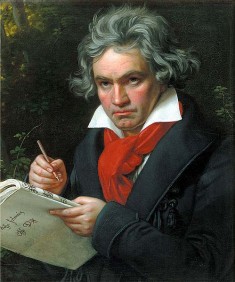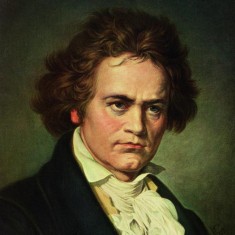| Ludwig van Beethoven | |
|---|---|
 |
|
| Composer | |
| Specialty | Pianist, symphonies |
| Born | baptised Dec. 17, 1770 |
| Died | Mar. 26, 1827 |
| Nationality | German |
Ludwig Beethoven was a famous German composer and pianist. He is a crucial figure in the transition period between the Classical and Romantic eras in Western music. He remains one of the most influential composers of history. He is best known for nine symphonies, 16 string quartets, five concertos for piano and 32 piano sonatas. Ludwig also composed other chamber music, songs, and choral works.
Early Life
Ludwig was born on December 17, 1770 in Bonn, the capital of the Electorate of Cologne. He was the grandson of a musician who came from Belgium. Ludwig’s first music teacher was his dad. His father was a harsh instructor and made Ludwig study. Ludwig was also taught by other teachers; the court organist, Tobias Pfeiffer, who taught the piano, and Franz Rovantini, who taught violin and viola.
In 1779, Ludwig started his studying with a very important teacher in Bonn named Christian Neefe. Neefe taught Ludwig composition and by March of 1783, he helped him write his very first published composition.
In 1781, Ludwig Van Beethoven started working with Neefe as his assistant organist. He worked as an unpaid employee for awhile before becoming a paid employee in 1784. His first three piano sonatas, entitled Kururst, were published in 1783.
In March of 1787, Ludwig traveled to Vienna for the first time in the hopes of studying with Mozart. After about two months, Ludwig learned of his mother’s illness and returned home. His mother died and his dad lapsed into deep alcoholism. As a result, Ludwig became responsible for the care of his younger siblings and spent the next five years in Bonn.
Beethoven’s Career Highlights
Ludwig van Beethoven was first introduced to Joseph Haydn in 1790 by his friend. This was when Joseph was traveling to London and stopped in Bonn around Christmas. Between 1790 and 1792, Ludwig composed a number of works that showed his growing maturity in musical composition.
Ludwig left Bonn for Vienna in November of 1792 after rumors of war in France. Over the next few years, he responded to a widespread feeling that he was a successor of the late Mozart. He studied Mozart’s works and other writings. At first, he concentrated on studying performance rather than composing. By 1793, he had already established a great reputation as an improviser in salons of the nobility; he often played the preludes and fugues of Well-Tempered clavier by Bach.
Becoming a Success
 Ludwig van Beethoven won many patrons who gave him lodging and funds. This allowed him to sever his ties with the Electorate of Cologne in 1794. He finally made his public debut in the town of Vienna in March of the same year. In 1795, he performed his first early piano concerti.
Ludwig van Beethoven won many patrons who gave him lodging and funds. This allowed him to sever his ties with the Electorate of Cologne in 1794. He finally made his public debut in the town of Vienna in March of the same year. In 1795, he performed his first early piano concerti.
Shortly after this, Ludwig decided to publish series of piano trios and his Opus 1; this was a great critical and financial success. In the spring of 1800, Ludwig debuted his First Symphony at Royal Imperial Theatre in Vienna.
As the new century progressed, Ludwig composed piece after piece and this marked him as a master composer reaching his own musical maturity. In 1801, he composed Six String Quartets and then Creatures of Prometheus later in the same year. This was a popular ballet that actually received a total of 27 performances at the Imperial Court Theater.
In 1804, few days after Napoleon was proclaimed Emperor, Ludwig debuted his Third Symphony, which was later renamed the Eroica Symphony.
Loss of Hearing
During the time he composing some of his greatest works, Ludwig was struggling to come to terms with the fact the he was going deaf. He struggled to make out all the words spoken in conversation. In 1801, he revealed in letter to his best friend, Franz Wegeler, that he led a very miserable life.
For about two years, he refused to attend most social functions and was finding it very hard to say that he was deaf. Despite his deafness, Ludwig still continued to be a composer. He composed one opera, six symphonies, four solo concerti, five string quartets, six string sonatas, seven piano sonatas, five piano variations, four overtones, four trios, two sextets and 72 songs.
Final Years and Death
Near end of his life, Ludwig van Beethoven composed one of his greatest works entitled Missa Solemnis. This debuted in 1824 and is actually considered his greatest achievement. Ludwig’s ninth and last symphony was completed in 1824.
On March 26, 1827, Ludwig died at 56 years of age. His death was caused by post-hepatitic cirrhosis of the liver.